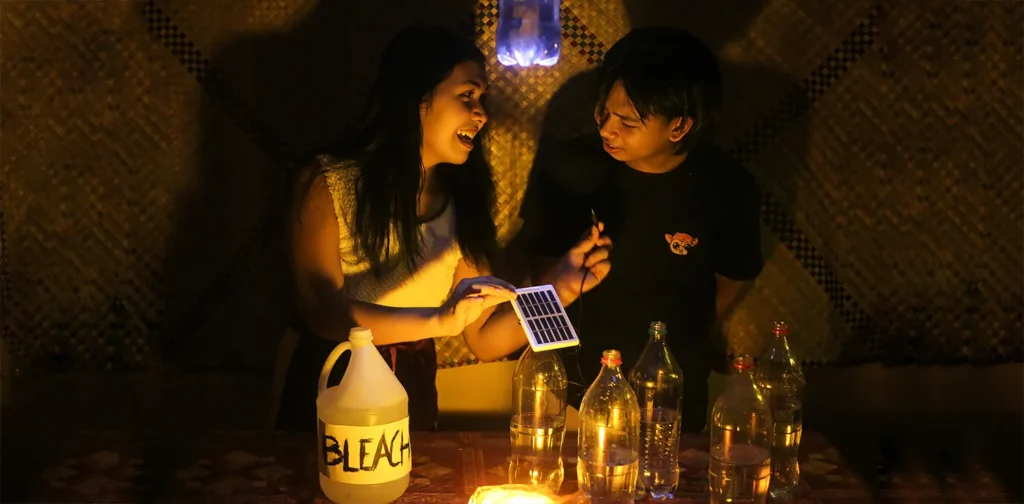Tackling Light Poverty with Clean and Affordable Solution

Photo by UNESCO-UNEVOC on Flickr
These days, it might be hard to imagine a world without lighting any time of the day, whenever we need it. Unfortunately, this remains a reality for millions of people, who still grapple with the issue of light poverty. Among efforts to tackle this issue, teaching local communities to make low-cost, low-tech solar-powered lamps is one of them.
Light Poverty and Lack of Access to Electricity
Light poverty refers to the lack of electric lighting after sunset. This circumstance may occur due to various social and economic factors, such as the inability to afford electricity or the absence of national electricity grids in rural areas.
The consequences of this issue are far-reaching. For children, it can hinder their ability to study and complete homework after dark. Additionally, businesses may struggle to operate effectively without sufficient lighting, leading to lost income and limiting economic growth within communities.
Since the early 2000s, access to electricity has increased profoundly, rising from 75% of the global population to 90% by 2020. However, despite this rapid progress, some communities still have limited or no access to electricity. A study using satellite imagery reveals that approximately 1.1 billion people in developing countries are energy-poor, showing no signs of light usage at night. This finding indicates a significantly higher number than the previous estimate of 733 million.
Mainstreaming Clean Energy Lighting
One of the viable options in tackling light poverty amidst a global triple-planetary crisis would be providing a clean, affordable, and practical source of light. An example of this is the work of Liter of Light, a global movement aiming to teach communities how to create low-cost, low-tech lamps.
The initiative is centered around making a simple, low-cost lamp that reflects sunlight to provide daytime illumination into houses. The lamp is created using cheap and recyclable materials, such as a two-liter plastic bottle filled with water and a small amount of bleach, fitted into a hole in the roof. The water refracts sunlight, delivering the equivalent of 40 to 60 watts of light indoors. A small solar panel and LED light are attached to the bottle bulbs for nighttime use, providing battery-powered light after dark.
In addition to teaching locals by opening workshops and training students in local schools, the movement empowers communities to become entrepreneurs by providing installation services for others.
Supporting Innovative Solutions for Sustainability
Sustainable development emphasizes the importance of leaving no one behind and ensuring access to energy for all. Similarly, tackling light poverty does not only mean illuminating dark corners of the world but also creating economic opportunities through training and upskilling. Therefore, supporting and scaling up technical innovations that address our current challenges is crucial, as well as providing an affordable, easy-to-replicate, and environmentally clean solution. Funders and policymakers need to recognize the potential of these innovations to solve shared problems and create a more equitable and just future for energy access.
Editor: Kresentia Madina & Nazalea Kusuma

Co-create positive impact for people and the planet.
Amidst today’s increasingly complex global challenges, equipping yourself, team, and communities with interdisciplinary and cross-sectoral insights on sustainability-related issues and sustainable development is no longer optional — it is a strategic necessity to stay ahead and stay relevant.
Dinda Rahmania
Dinda is an Assistant of International Partnerships at Green Network Asia. She holds a bachelor’s degree in International Relations from President University. As part of the GNA In-House Team, she supports the organization’s partnerships with international organizations, governments, businesses, and civil society worldwide through digital publications, events, capacity building, and research.


 Reframing Governance in the Era of Water Bankruptcy
Reframing Governance in the Era of Water Bankruptcy  Strengthening Resilience amid Growing Dependence on Space Infrastructure
Strengthening Resilience amid Growing Dependence on Space Infrastructure  Indian Gig Workers Push Back Against 10-Minute Delivery Service Strain
Indian Gig Workers Push Back Against 10-Minute Delivery Service Strain  Call for Governance: Grassroots Initiatives Look to Scale Efforts to Conserve Depleting Groundwater
Call for Governance: Grassroots Initiatives Look to Scale Efforts to Conserve Depleting Groundwater  Integrating Environment, Climate Change, and Sustainability Issues into Education Systems
Integrating Environment, Climate Change, and Sustainability Issues into Education Systems  Finally Enforced: Understanding the UN High Seas Treaty
Finally Enforced: Understanding the UN High Seas Treaty